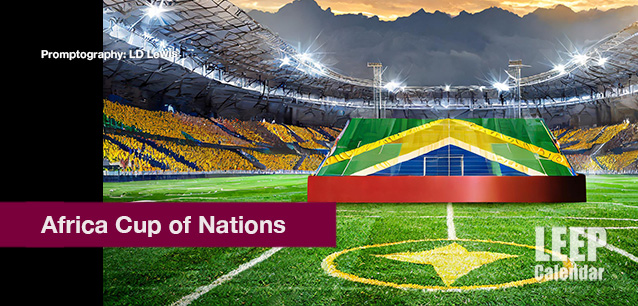 AD
AD
Today is: April 21
Scroll to explore events active on this date.
LEEP INK FEATURES

Events in April 2025
Spring has sprung in the north, and the first hints of Autumn are on the horizon in the south. April is the month spring (or fall) gets underway, and it is filled with religious celebrations, including the Mu...

Metamorphic March: Trends and events in March 2025
Welcome to Spring or Autumn. This is a transitional month with something for everyone. Internationally, it is Women's History Month, focusing on the achievements, needs, and challenges that women ...

February Favorites
The world steps into the second month of 2025 with hope and trepidation. The United States has a new administration. Canada is finding its way to a new administration. Germany and several other European nations...
About the Africa Cup of Nations
Ends: Jul 14, 2025
DESCRIPTION:
THE AFRICA CUP OF NATIONS
In a journey through the annals of African football, the Africa Cup of Nations stands as a towering monument to the continent's passion and prowess in the sport. Created in 1957, it emerged as a tournament and a symbol of unity and competitive spirit among African nations.
The inaugural event, hosted by Sudan, was a modest affair compared to the grandeur it commands today. With only three participating countries - Egypt, Sudan, and Ethiopia - Egypt won the first edition, setting the stage for what would become Africa's premier football competition.
The Africa Cup of Nations, often abbreviated as AFCON, began as the continent experienced significant political and social transformation. Many countries were on the cusp of independence, and there was a burgeoning sense of pan-Africanism. This tournament served a dual purpose: a celebration of football and an act of unity among nations shaking off the shackles of colonialism.
Played every two years, AFCON is not just about crowning the champions of African football. It's a festival that brings together nations, showcasing their unique cultures and identities through their teams and fans. The competition has grown in scale and popularity, with an increasing number of teams participating and a global audience tuning in.
Historically, the tournament has been a launching pad for African players, showcasing their talents internationally and often leading to careers in Europe's top leagues. Legends of the game like Samuel Eto'o, Didier Drogba, and Yaya Touré have all shone brightly at AFCON, etching their names into the fabric of the tournament's rich history.
Beyond the glitz of the games, AFCON has often mirrored its host nations' social and political climates. It has been played amid political upheavals and social unrest, and at times, it has been a unifying force, bridging divides and bringing people together in celebration of a shared love for football.
As AFCON continues to evolve, it remains a testament to Africa's enduring love for football, a sport that transcends boundaries and unites a diverse continent in spirited competition and camaraderie.
VIDEOS
SUPPORTING DOCUMENTS
Currently, this event does not have supporting documents.
ADDITIONAL IMAGES
Currently, this event does not have supporting images.
Where would you like to go now?
 AD
AD


/footer-logo.svg)
